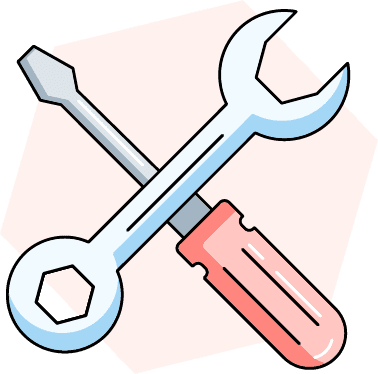Home repair insurance, also known as a home warranty, is a service contract that helps homeowners pay for unexpected repair costs when an appliance or home system breaks down. It’s designed to complement an existing home insurance policy.
Unlike home insurance, home repair insurance covers damage caused by normal wear and tear. It covers a variety of systems throughout the home, including:
- Plumbing
- Electrical
- Heating
- Air conditioning
- Appliances
While home repair insurance helps fill some of the gaps in home insurance, it does not cover all repairs. Pre-existing damage and problems caused by poor maintenance are key exclusions.
Understanding how home repair insurance works can help you decide whether or not you need coverage. Read on for details.
Table of Contents

How Does Home Repair Insurance Work?
With home repair insurance, homeowners pay a monthly or annual fee in exchange for coverage. When appliances or home systems break, they can file a service request. The insurance company arranges for a technician to repair the problem.
Who Can Get HRI?
Eligibility rules vary from company to company, but in general, homeowners can buy coverage if they:
- Own a single-family home, townhouse, or condominium
- Keep their home well-maintained and in good condition
- Do not use their home for business purposes
What Does HRI Cover?
Home warranty insurance is another term used to describe HRI. Household appliances and systems usually have a warranty for the first year or longer, and home warranty insurance works similarly, but it covers your home appliances and systems as a whole. The specifics of what each insurance policy covers are different, so check the sample policy before taking out coverage.
Home warranty insurance covers the cost of repair or replacement of household appliances and systems. Many providers offer 3 types of plans: a systems plan, an appliances plan, and a combination plan. Some insurers offer the option to add cover for hot tubs, septic tanks, pest control, and other less common items. What each provider covers is different, but a home warranty plan often includes the following systems and appliances:
- Heating
- Plumbing
- Electrical
- Air Conditioning
- Oven, stove, microwave (built-in)
- Refrigerator
- Dishwasher
- Clothes washer and dryer
- Garbage compactor and disposal
- Smoke detectors
- Ceiling fans
- Garage door opener
What Does HRI Not Cover?

Home repair insurance does not cover some repairs or replacements. Key exclusions to be aware of include:
- Sudden, unforeseen events: Home maintenance insurance is not for events such as fire, theft, vandalism, severe weather, or natural disasters. Instead, these events fall under your home insurance policy.
- Poor installation or maintenance: Items that have been improperly installed or poorly maintained are not covered since insurers expect policyholders to perform good home maintenance.
- Full cost of repairs: Home repair policies have coverage limits, meaning they cover costs up to a set amount. Homeowners are responsible for any remaining costs.
Home warranty policies do not cover damage caused by unforeseen one-off events. Damage caused by these events is not covered because it is not considered part of normal wear and tear. Instead, standard home insurance plans can provide protection for these types of damages.
Additionally, insurers do not cover items that have been improperly installed or poorly maintained. For example, a clothes washer that was not correctly connected to the plumbing would not be covered, nor would a refrigerator that was internally corroded by rust. Insurers expect policyholders to take reasonable care of items as part of preventative maintenance, thereby ensuring claims are only made when necessary.
Insurance companies also include coverage limits on home warranty policies, meaning they do not cover costs above a certain amount. Insurers place coverage limits on your policy documents, including specific limits per item, per year, and per claim.
What Is Normal Wear and Tear?
Home repair insurance covers damages caused by normal wear and tear. That’s damage that occurs over time due to normal use of the home. For example, if a person uses their stove every night to cook dinner, critical components like the control board and heating elements will eventually wear out, causing the stove to stop working.
Normal wear and tear does not include damage from excessive use or from using the home for business purposes. It also does not include damage that occurs due to neglect: Homeowners are expected to keep their appliances and home systems in good condition through regular maintenance.
Is HRI Worth It?

To estimate how much you can save with an HRI plan, compare the costs of repairing and replacing common items with the annual cost of an HRI plan, plus the service fee. In the following examples, we’ve based our estimates on an annual plan cost of $600 and a service fee of $100.
The average repair cost for an air conditioning system is $393, and the average replacement cost is $5,856. With home warranty coverage, you could save $5,156 on replacing an air conditioning system, depending on the insurer’s upper coverage limits.
For refrigerators, the average repair cost is $250, and the average replacement cost is $1,500, but with home warranty insurance, you could save $800 on the cost of replacing the appliance.
Clothes washers cost $180 on average to repair, and to replace, they can cost $850, so with HRI, you can save $150 to replace the appliance.
Home Repair Insurance vs. Home Warranty Insurance
Home repair insurance and home warranty insurance are often used interchangeably since they both provide coverage for appliances and home systems. However, they serve different purposes for homeowners.
Home warranty insurance is typically purchased when buying a home. It’s designed to help protect buyers from unexpected problems with their new home. Sometimes, the seller or real estate company pays for the warranty.
Home repair insurance, on the other hand, can be purchased at any time. It helps protect existing homeowners from unexpected repair costs due to normal wear and tear.
How Much Does Home Repair Insurance Cost?

Home maintenance insurance costs $50 per month on average. Basic plans can cost closer to $30 per month on average by covering only key items, and adjusting to a higher service fee can also bring down monthly payments. Premium plans can cost as much as $118 on average and are needed when covering more unusual or luxury items.
The cost of your HRI policy depends on factors such as:
- Home location: Your home’s location affects your plan’s cost because regulations and taxes differ from state to state. The same insurer may quote differently depending on where you live.
- Service fees: When the technician makes the repairs, you pay a service fee. Service fees are $75 to $125 on average. If you adjust to a higher service fee, this can reduce your monthly payments.
- Coverage limits: Insurers cap the coverage they provide per item, year, or claim. If you adjust your policy to lower coverage limits, this may lower what you pay each month. This makes you responsible for any costs exceeding that limit if you claim.
- Any policy exclusions: If any appliances or systems are faulty or have been improperly maintained or installed, these are known as pre-existing conditions and are excluded from the policy. Many insurers also do not cover weather events, which are often covered by standard homeowners insurance.
Should You Get HRI?
Home repair insurance is a good choice for some homeowners. You may decide home insurance for repairs makes sense if:
- You live in an older home. Home systems develop issues as they age due to normal wear and tear. In a 40-year-old house, many components in the heating, plumbing, or electrical systems may have reached or exceeded their life expectancies.
- You have older appliances. Just like home systems, appliances can be expected to last for a certain number of years. Major appliances may need to be replaced around the 10-year mark.
- You do not have funds for repairs. People who have enough savings to cover unexpected repairs or replacements may not need HRI. On the other hand, if you do not have money set aside, HRI could be helpful.
- Protects from high repair bills
- Predictable costs
- Convenient process
- Less control over repairs
- Limits and exclusions
- Service fees
Pros
- Protection from high repair bills. Home repair insurance pays for covered repairs and replacements up to its coverage limits, which shields homeowners from the potentially high costs of unexpected repairs.
- More predictable home repair costs. Homeowners can plan for a set premium each month and a portion of any needed repairs, allowing them to budget for home repairs more effectively.
- Convenient repairs process. When an appliance or system breaks, the insurance company sends a licensed service provider from its network to fix the issue.
Cons
- Less control over repairs. Homeowners who already have trusted contractors or prefer hands-on involvement in the repairs process may find home repair insurance restrictive rather than convenient.
- Limitations and exclusions. Repairs are covered up to a specific dollar limit, and some types of repairs are not covered. Limitations and exclusions vary from plan to plan.
- Service fees. Homeowners are responsible for paying a service fee each time a contractor comes to their home, which makes the insurance coverage less cost-effective for smaller home repairs.
All in All
No matter how well a person maintains their home, household appliances and home systems will eventually break down due to normal wear and tear. Home repair insurance helps protect homeowners from the unexpected costs of repairing or replacing broken items.
Like any type of insurance, home insurance for repairs is a good option for some people but not for others. If you’re interested in home repair insurance, talk to a trusted insurance professional to assess your individual coverage needs.
